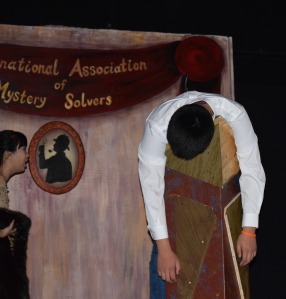
Photo: Poughkeepsie Day School
“It’s one thing to talk about this in the abstract, Fred, but tell me – have you ever, like, actually killed someone?”
“Other than my tours of duty with the Marines? No. But I kill people with words, every day.”
“Oh, come on, Fred. Killing people off in novels is pure fiction, pardon the pun.”
“No, I’m not talking about my novels. It’s my reporting work, my crime beat. People die every day, and I write about them.”
“But that’s just not the same thing, Fred. For one thing, you had no hand in their deaths, other than writing about it after the fact.”
“Well, the public at large doesn’t know they’re dead until I write about them. These people die in the public mind only when they read what’s in the papers.”
“Really, Fred? You’re going with the ‘If a tree falls in a forest…’ trope?”
“It’s actually more than that. And I’m quite serious. Alright, how about a concrete example? Joe Bloe rats on his Mafia bosses, goes into the Federal Witness Protection Program, and becomes John Doe. And Joe Bloe disappears. Gone, poof! I’d say that classifies as a death.”
“But not in a physical sense! At best, that works as a loss of identity.”
“I think you’re being naïve, if I may say so. Our identities define us. Or have you not read about the Ship of Theseus?”
“I can’t believe I’m listening to this. Ship of Theseus? Tearing down and re-creating an identity doesn’t change physical and biological facts.”
“But it gets to the very heart of what we know, how we know it, and how that knowledge defines reality.”
“I’m a simple guy, Fred. We can debate this in the philosophical realm all you want, but it all falls apart the moment you get down to biology. Death has to involve a lifeless body, you know — a heart that’s stopped ticking. Habeas corpus, and all that. Produce the body!”
“But we accept death everyday, simply on the basis of having read about it. We assume someone, somewhere must have seen the body. In our minds, in the minds of my half-a-million subscribers, these people are dead.”
“Alright, fine. I’ll go along. Where are we going with this?”
“Well, surely you have heard of identity theft by now? My thesis is not unlike the Joe Bloe example. Hack into the system, erase all trace of an identity – and bingo, we have identity death. Then we write about it, and it all becomes quite real.”
“I think you’re getting quite carried away, Fred. You’re banking on anonymity here. Those newspaper deaths you keep talking about – they work because we don’t know any of those people personally. You can erase my identity, but my wife would still know I exist. My kids, my friends, …come on!”
“And I think you’re counting on all of those things a little too much. You clearly haven’t thought about this as much as I have. It’s quite powerful, actually. All I need is a test case, and it will become quite clear that this is not idle speculation.”
“A test case?”
“Yes, exactly. What if I erased your identity, for example?”
“Well, I’ll just call my wife. No, wait, even better. I’ll Face Time her. You can say hello, if you want.”
“On your cell phone? You really haven’t thought through this, have you?”
“OK, fine, I get that. My cell phone wouldn’t work anymore because I’m ‘theoretically’ dead. But, I can call her on the landline. I can drive home and see her in person.”
“I don’t want to burst your bubble, but there are a few minor issues that might prevent you from getting there. The police, for one, will want to know what you’re doing in a vehicle that once belonged to someone else, now deceased. Not to mention how immeasurably crude and insensitive it would be to put your wife, or should I say, your widow, through all that while she is mourning your loss.”
“Fred, I think you’ve been brooding here by yourself a little too much, man. You’ve totally lost your marbles! I think I should leave now.”
“Oh, not at all. I’m quite alright, thank you. And I wouldn’t go anywhere just yet. Especially not without reading this first.”
“What is this? … Oh my god, what sort of sick joke is this? Fred, this is my obituary!”
“Yes, I’m afraid it is. I needed a test case, remember? You’re dead, Jake. Or Dan, or Frank, or whatever your name is in the digital afterlife. It’s quite a nice obituary, actually. One of my better pieces. And quite generous, too. I gave you 500 words.”
The motivation for this story came from Chuck Wendig’s blog, at http://terribleminds.com/ramble/2016/04/29/flash-fiction-challenge-ten-titles-you-made-up/
LikeLike